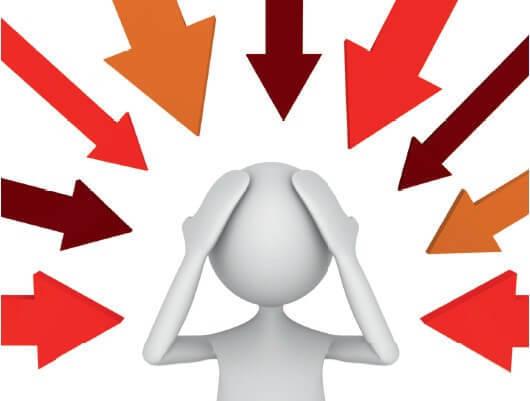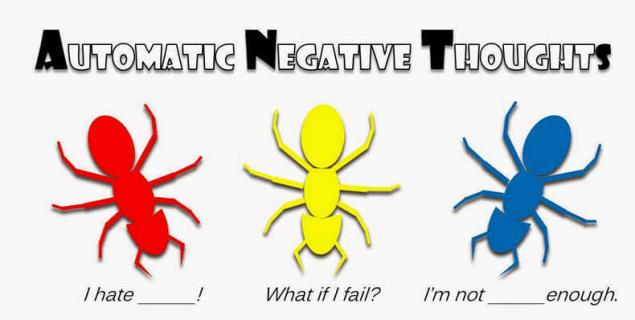825
Intrusive negative thoughts — WHAT to DO
The quality of your thoughts also affects the brain. Happy, supportive, positive thoughts improve brain function, and the negative turn off certain nerve centers. Automatic negative thoughts can torture and torment you until you take specific actions to get rid of them.

We will talk with you about the inner critic, but in the meantime check out the concept of ants. Ant (English). ant—; for "automatic Intrusive negative thoughts" are abbreviated to "ANTs", (automatic negative thoughts). Or "cockroaches".

They — like the background of our reflection. Involuntary negative thoughts come and go spontaneously, as bats fly in and fly out, bringing with it doubt and frustration, we almost do not notice in their daily lives.
For example, when you miss the train, you think to yourself: "I'm such a dunce, I always do everything at the last moment", or when you measure the clothes and look at yourself in the mirror: "Ugh, what a nightmare, it's time to lose weight!".
Intrusive negative automatic thoughts is incessant voice that sounds in our head 24 hours a day: negative ideas, comments, negative thoughts about ourselves. They constantly pull us down, they are like footnotes and comments that undermine our confidence and self-esteem. It is the "second wave" of thoughts, which is noticed Beck.
The first thing you should pay attention to these thoughts, learn to recognize when they appear and when they leave your consciousness. Look at the picture of glass: negative thoughts are the foam on the surface. It hisses and dissolves, revealing your thoughts or feelings that you feel in the moment.
They reflect the importance that we attach to what is happening around us. They also give us to understand how we perceive the world and what occupied a place in it. Automatic negative thoughts are a manifestation of the fact that rises from the bottom of the glass, that floats on the surface with a deeper psychological level.
Automatic negative thoughts are greatly inhibit self-esteem, they are like endless nagging; negative in nature, they will always make comments in your address, causing depression, giving everything you are trying to do or what are trying to achieve, a negative connotation.
If you become aware of your negative thoughts, it will help you to deal with their deeper emotional problems. Automatic negative thoughts drop by drop put pressure on you, distorting your self-confidence and self-esteem.

Automatic Intrusive negative thoughts:
Anger, resentment, sadness, or disappointment help release negative chemicals that activate the limbic system and affect physical wellbeing. Remember how you felt the last time you were angry? Most people have tense muscles, the heart beats faster, my hands start to sweat.
The body reacts to every negative thought. Doctor of medicine mark George proved it with elegant studies of the brain at the National Institute of mental health. He examined the MRI scanner 10 women and asked them in turn to think of something neutral, something joyful and sad.
At a neutral thought in the brain, nothing has changed. Joyful thoughts were accompanied by calming the limbic system. When sad thoughts the limbic system of the subjects became highly active. This is conclusive evidence that your thoughts matter.
Every time I think of something good, joyful, pleasant and good, you emit in the brain neuro-mediators that help soothe the limbic system and improve physical health. Remember how you felt when you were happy. Most of the people are relaxed, they have slowed down the heart rate, the hands remain dry. They breathe deeper and calmer. That is, the body responds to good thoughts.
What is the limbic system? It is the most ancient part of the brain which is in its very depth, more precisely in the center towards the bottom. What she says:

If every day you worry, namely, deliberately thinking about what bad can happen to you and your family in the future, thus have a history of an anxiety disorder but still have adverse childhood experiences, it is likely that your limbic system is very active.
Quite interestingly, the stronger the limbic system of the cortex, including the frontal, which is conscious and controlled. So if limbii hit charge activity, the bark is not always able to cope. Moreover, the main impact is not on the bark directly and in a roundabout way. The pulse is fed into the hypothalamus, and it instructs the pituitary gland to the secretion of hormones. And the hormones are themselves trigger a particular behavior.
When limbika quiet ( low activity mode) we experience positive emotions, hope, feel included in society and loved ones. We have a good sleep and a normal appetite. When she's overexcited – the emotions are generally negative. The limbic system is responsible for translating feelings into a physical state of relaxation and tension. If the person has not done what he was asked, his body will remain relaxed.
I explain that bad thoughts are like an invasion of ants in the head. If you are sad, depressed and anxious, then you are attacked automatic negative thoughts"ants". So, you need to call a big, strong internal anteater to rid of them. Kids love this metaphor.
Each time, seeing the "ants" in my head, push them until they managed to ruin relationships and undermine self-esteem.
One of the ways to deal with such "ants" — to write them on a sheet of paper and discuss. You should not take every comes into the minds of the idea as the ultimate truth. You need to decide what are the "ants" to visit you, and deal with them before they took away your power. I have identified 9 types of "ants" (automatic negative thoughts), showing a situation worse than they really are. Defining type "ant" you will gain power over him. Some of these "ants" I refer to red, that is particularly harmful.
9 types of automatic negative thoughts
1. Generalization accompanied by the words "always", "never", "no", "every", "every", "all".
2. The emphasis on the negative: the celebration of the only bad moments in every situation.
3. Prediction: in all see only a negative outcome.
4. Mind reading: the confidence that you know what another person is thinking, even when he talked about it.
5. Mixing thoughts with feelings: inEPA's negative feelings without a doubt.
6. The punishment of guilt: accompanied by representations of "must", "must", "must".
7. Labeling: assigning negative labels to yourself or others.
8. Personalization: the adoption of any neutral events to your account.
9. Accusation: tendency to blame others for their troubles.

Type of negative thoughts 1: SYNTHESIS
These "ants" crawling, when you operate with such words as "always", "never", "always", "every". For example, if someone in the Church annoys you, you'll think to himself: "People in the Church always nagging at me" or "go To Church, only hypocrites."
Although these thoughts are clearly erroneous, they can be very powerful, for example, may forever scare you away from the Church. Negative thoughts summarizing almost always wrong.
Here's another example: if the child does not obey, the head can creep up the "ant": "He always doesn't listen to me and do what I ask", even though most of the time the child is behaving quite obediently. However, the idea of "He always doesn't listen to me" is so negative that drives you into anger and frustration, activates the limbic system and causes a negative reaction.
Here are examples of "ants"-generalizations:
Type 2 negative thoughts: FOCUS ON the NEGATIVE
In this case, you only see the negative aspect of the situation, although almost everything has a positive side. These "ants" diminish the positive experience, good relationships and working interactions. For example, you want to help your neighbor. You have the opportunity to do, and you know what to do.
But, intending to offer assistance, you suddenly remember one neighbor has hurt you. And although at other times you friend spoke with him, thoughts begin to revolve around the unpleasant incident. Negative thoughts discourage the desire to help someone. Or imagine that you have a wonderful date. Everything is going well, the girl is beautiful, smart, nice, but I was late for 10 minutes.
If you focus your attention on her you are late, you can ruin a potentially beautiful relationship. Or did you first come to a new Church or synagogue. This is a very important experience. But someone noisy distracts you from the service. If you focus on the obstacle, the impression will be spoiled.
Type of negative thoughts 3: BAD PREDICTIONS
These "ants" crawling, when we foresee in the future something bad. The ants-stand predictors of anxiety disorders and panic attacks. Predicting the worst cause an immediate acceleration of heart rate and respiration. I call such expectations red "ants," because, anticipating the negative, you thereby cause. For example, you think that day will be bad.
The first hint of failure strengthens this belief, and until the end of the day you are depressed. Predictions of the negative violate the peace. Of course, you should plan and prepare for different scenarios, but you cannot focus only on the negative.
Type of negative thoughts 4: READING the IMAGINARY thoughts of OTHERS
This is when you think you know the thoughts of other people, although they were not told about them. This is a common cause of conflict between people.
Here are examples of these automatic negative thoughts:
Type of negative thoughts 5: MIXING THOUGHTS WITH FEELINGS
These "ants" appear, when you begin to trust your feelings. Feelings are a very complex phenomenon and is usually based on memories from the past. However, they often lie. Feelings — not necessarily true, it's just feelings. But many believe that their emotions always tell the truth.
The appearance of these "ants" are usually marked by the phrase: "I feel that...". For example: "I feel that you don't love me", "I feel stupid", "I feel like a loser", "I feel like nobody believes in me". Having something to "feel", recheck, and do you have proof? Are there any real reasons for such emotions?
Type of negative thoughts 6: PUNISHMENT FEELING of GUILT
Exaggerated sense of guilt is rarely a helpful emotion, especially for your deep limbic system. It usually leads to the fact that you make mistakes. The punishment of guilt occurs when the head POPs up the word "must", "must", "should", "should".
Here are some examples:
For example:
Type of negative thoughts 7: labeling
Every time you stick a negative label on yourself or another, you prevent yourself to look clearly at the situation. Negative labels are very harmful, because calling someone a jerk, unnecessary, irresponsible, or arrogant, you equate it to all the jerks and the irresponsible people you will ever meet, and lose their ability to communicate with them productively.
Type of negative thoughts 8: PERSONALIZATION
These "ants" force you to take any innocent event into your account. "This morning the boss didn't talk to me, must be mad". Sometimes a man thinks that he is responsible for all the trouble. "My son was in a car accident, I had more time to teach him driving, it was my fault." For every trouble there are many explanations, but a hyperactive limbic system picks out only those that concern you. The chief may not talk because busy, upset or in a hurry. You are free to know why people do what they do. Do not try to adopt their behavior to your account.
Type of negative thoughts 9 (the most poisonous red "ants"!): CHARGES
The accusations are very harmful, because blaming someone else for their problems, you become the position of the victim and is not able to do something to change the situation. A huge number of personal relationships fell apart because people were blaming all the troubles of the partners did not take responsibility. If at home or at work something went wrong, they were dismissive and sought to blame.
"Ants"-the charges usually are as follows:
In order for the brain to function correctly, you must control your thoughts and emotions. Noticing crawled into the consciousness of the "ant", recognize it and record its essence. Recording automatic negative thoughts (ANT), you question them and regain the power that they steal. Kill internal "ants" and feed them your "anteater".
Your thoughts are extremely important because they soothe or incite the limbic system. Leaving the "ants" without supervision, you infiniroute whole body. Refuting automatic negative thoughts every time you notice them.
Automatic negative thoughts are based on irrational logic. Pulling them up to the light and examined under a microscope, you will see how they are ridiculous and cause a lot of damage. Keep your life under control, not leaving their fate to the will of a hyperactive limbic system.
Sometimes people find it difficult to argue the negative thoughts because they think that they will engage in self-deception. But to know what is true and what is not, you need to be aware of their thoughts. Most of the "ants" crawl undetected, they choose not you, and your poorly tuned brain. To find the truth, you must doubt.
I often ask patients about automatic negative thoughts: how many of them, a little? Below the limbic system was healthy, you need to keep the "ants" under control.

What to do?
0. To cultivate mindfulness. Developed awareness is the best way of treatment and preventing negative thoughts.
1. Osluzhivanie negative thoughts. Learn how to see them. Negative thoughts – this is part of a vicious circle. Limbika signals – causes bad thoughts — bad thoughts cause the activation of the amygdala ( the chief guardian of the brain) the amygdala is partially pulls the excitation in limbic - libmca even more activated.
2. Think of them as just thoughts – unreal education. Do not attach values to them. Actively push them shouldn't, either. Feed your "anteater". Maintain the habit of finding the negative thoughts and revise them. Strongly praise myself for it.
3. Doubt. Sometimes people find it difficult to argue the negative thoughts because they think that they will engage in self-deception. But to know what is true and what is not, you need to be aware of their thoughts. Most of the "ants" crawl undetected, they choose not you, and your poorly tuned brain. To find the truth, you must doubt. I often ask patients about automatic negative thoughts: how many of them, a little? Below the limbic system was healthy, you need to keep the "ants" under control.
4. Look for external confirmation. Attract to yourself more people who give you positive feedback. Good communication calm limbico, it makes sense of gratitude... Fokusirovka on the positive, identify it. Positive thoughts not only good for you personally, they help the brain work better. Every day write down five things you are grateful for that day.
5. Teach people around you to build a strong emotional connection with you ( Express your feelings, show the importance of the people around you, refresh your relationships, strengthen intimacy, etc). Reduce stress with the power of oxytocin. About it I will write.

6. Act in spite of fear.
Can a positive behavior change the brain? Researchers from the University of California at Los Angeles assessed the relationship between brain functioning and behavior in patients with obsessive-compulsive disorder (OCD). People with OCD randomly divided into two groups. One of them was treated with drugs and other behavioral therapy.
The researchers conducted MRI, PET (like SPECT) before and after therapy. Medication group was treated with antidepressant, have shown calming down activity in the basal ganglia, which are involved in the getting stuck on the negative. Group behavioral therapy showed the same results.
Behavioural therapy was that patients were placed in a stressful situation and demonstrating that anything is wrong with them not happening. This therapy is aimed at reducing sensitivity to fear-inducing objects and situations.
10 beliefs about the diseases which we should ignore
Kinesiological test: Find out what it takes health, and gives energy
For example, people who have experienced the obsessive fear of "mud", seeing her everywhere, asked to touch a potentially dirty object (say, a table) and with the help of the therapist to refrain from immediate hand washing.
Gradually, people switched to more "scary" objects. In the end, their fears diminished and disappeared altogether. Behavioral therapy was and other techniques, such as overcoming obsessive thoughts (people were asked to stop thinking about the bad), distraction (tip to switch to something else). published
Author: Andrey Blueskin
Source: www.beloveshkin.com/2015/04/avtomaticheskie-navyazchivye-negativnye-mysli-tarakany-v-golove.html

We will talk with you about the inner critic, but in the meantime check out the concept of ants. Ant (English). ant—; for "automatic Intrusive negative thoughts" are abbreviated to "ANTs", (automatic negative thoughts). Or "cockroaches".

They — like the background of our reflection. Involuntary negative thoughts come and go spontaneously, as bats fly in and fly out, bringing with it doubt and frustration, we almost do not notice in their daily lives.
For example, when you miss the train, you think to yourself: "I'm such a dunce, I always do everything at the last moment", or when you measure the clothes and look at yourself in the mirror: "Ugh, what a nightmare, it's time to lose weight!".
Intrusive negative automatic thoughts is incessant voice that sounds in our head 24 hours a day: negative ideas, comments, negative thoughts about ourselves. They constantly pull us down, they are like footnotes and comments that undermine our confidence and self-esteem. It is the "second wave" of thoughts, which is noticed Beck.
The first thing you should pay attention to these thoughts, learn to recognize when they appear and when they leave your consciousness. Look at the picture of glass: negative thoughts are the foam on the surface. It hisses and dissolves, revealing your thoughts or feelings that you feel in the moment.
They reflect the importance that we attach to what is happening around us. They also give us to understand how we perceive the world and what occupied a place in it. Automatic negative thoughts are a manifestation of the fact that rises from the bottom of the glass, that floats on the surface with a deeper psychological level.
Automatic negative thoughts are greatly inhibit self-esteem, they are like endless nagging; negative in nature, they will always make comments in your address, causing depression, giving everything you are trying to do or what are trying to achieve, a negative connotation.
If you become aware of your negative thoughts, it will help you to deal with their deeper emotional problems. Automatic negative thoughts drop by drop put pressure on you, distorting your self-confidence and self-esteem.

Automatic Intrusive negative thoughts:
- they steadily exist in your mind
- you just need to begin to notice them;
- they are recognized
- show how you think they are on the surface, it's not subconscious;
- they inhibit
- due to the fact that they are inherently "bad," they plunge you into depression and spoil the mood;
- they are regulated
- depend on the situation (for example, if they are walking on the street, you think, "I'm scared, now I have someone to attack");
- they "like the truth" — this is the mask that we put on and believe them (e.g. "I am worthless", "I'm too fat in these jeans", "I'll never do work on time", "I always choose the wrong/the wrong guy/girl", "nobody loves Me");
- we engage in internal dialogue
- we can always something to persuade or something to talk: we put on a mask, and believe them;
- they are constant, especially if your problem has already infiltrated into your life, for example, if you have depression. Your NNM continually convince you that you're awful, that nobody likes you that you are worthless, that you are helpless and alone.
Anger, resentment, sadness, or disappointment help release negative chemicals that activate the limbic system and affect physical wellbeing. Remember how you felt the last time you were angry? Most people have tense muscles, the heart beats faster, my hands start to sweat.
The body reacts to every negative thought. Doctor of medicine mark George proved it with elegant studies of the brain at the National Institute of mental health. He examined the MRI scanner 10 women and asked them in turn to think of something neutral, something joyful and sad.
At a neutral thought in the brain, nothing has changed. Joyful thoughts were accompanied by calming the limbic system. When sad thoughts the limbic system of the subjects became highly active. This is conclusive evidence that your thoughts matter.
Every time I think of something good, joyful, pleasant and good, you emit in the brain neuro-mediators that help soothe the limbic system and improve physical health. Remember how you felt when you were happy. Most of the people are relaxed, they have slowed down the heart rate, the hands remain dry. They breathe deeper and calmer. That is, the body responds to good thoughts.
What is the limbic system? It is the most ancient part of the brain which is in its very depth, more precisely in the center towards the bottom. What she says:
- sets the emotional tone
- filters exterior and inside experience ( distinguish between what we ourselves think and what actually happens)
- indicates internal events as an important
- stores emotional memory
- modulates motivation ( what we want, and do what is required of us)
- controls appetite and sleep cycle
- provides emotional connection with other people.
- handles odors
- regulates libido

If every day you worry, namely, deliberately thinking about what bad can happen to you and your family in the future, thus have a history of an anxiety disorder but still have adverse childhood experiences, it is likely that your limbic system is very active.
Quite interestingly, the stronger the limbic system of the cortex, including the frontal, which is conscious and controlled. So if limbii hit charge activity, the bark is not always able to cope. Moreover, the main impact is not on the bark directly and in a roundabout way. The pulse is fed into the hypothalamus, and it instructs the pituitary gland to the secretion of hormones. And the hormones are themselves trigger a particular behavior.
When limbika quiet ( low activity mode) we experience positive emotions, hope, feel included in society and loved ones. We have a good sleep and a normal appetite. When she's overexcited – the emotions are generally negative. The limbic system is responsible for translating feelings into a physical state of relaxation and tension. If the person has not done what he was asked, his body will remain relaxed.
I explain that bad thoughts are like an invasion of ants in the head. If you are sad, depressed and anxious, then you are attacked automatic negative thoughts"ants". So, you need to call a big, strong internal anteater to rid of them. Kids love this metaphor.
Each time, seeing the "ants" in my head, push them until they managed to ruin relationships and undermine self-esteem.
One of the ways to deal with such "ants" — to write them on a sheet of paper and discuss. You should not take every comes into the minds of the idea as the ultimate truth. You need to decide what are the "ants" to visit you, and deal with them before they took away your power. I have identified 9 types of "ants" (automatic negative thoughts), showing a situation worse than they really are. Defining type "ant" you will gain power over him. Some of these "ants" I refer to red, that is particularly harmful.
9 types of automatic negative thoughts
1. Generalization accompanied by the words "always", "never", "no", "every", "every", "all".
2. The emphasis on the negative: the celebration of the only bad moments in every situation.
3. Prediction: in all see only a negative outcome.
4. Mind reading: the confidence that you know what another person is thinking, even when he talked about it.
5. Mixing thoughts with feelings: inEPA's negative feelings without a doubt.
6. The punishment of guilt: accompanied by representations of "must", "must", "must".
7. Labeling: assigning negative labels to yourself or others.
8. Personalization: the adoption of any neutral events to your account.
9. Accusation: tendency to blame others for their troubles.

Type of negative thoughts 1: SYNTHESIS
These "ants" crawling, when you operate with such words as "always", "never", "always", "every". For example, if someone in the Church annoys you, you'll think to himself: "People in the Church always nagging at me" or "go To Church, only hypocrites."
Although these thoughts are clearly erroneous, they can be very powerful, for example, may forever scare you away from the Church. Negative thoughts summarizing almost always wrong.
Here's another example: if the child does not obey, the head can creep up the "ant": "He always doesn't listen to me and do what I ask", even though most of the time the child is behaving quite obediently. However, the idea of "He always doesn't listen to me" is so negative that drives you into anger and frustration, activates the limbic system and causes a negative reaction.
Here are examples of "ants"-generalizations:
- "She always gossips";
- "At work nobody cares for me";
- "You never listen to me";
- "Everyone is trying to use me";
- "Keep interrupting me";
- "I never get to rest."
Type 2 negative thoughts: FOCUS ON the NEGATIVE
In this case, you only see the negative aspect of the situation, although almost everything has a positive side. These "ants" diminish the positive experience, good relationships and working interactions. For example, you want to help your neighbor. You have the opportunity to do, and you know what to do.
But, intending to offer assistance, you suddenly remember one neighbor has hurt you. And although at other times you friend spoke with him, thoughts begin to revolve around the unpleasant incident. Negative thoughts discourage the desire to help someone. Or imagine that you have a wonderful date. Everything is going well, the girl is beautiful, smart, nice, but I was late for 10 minutes.
If you focus your attention on her you are late, you can ruin a potentially beautiful relationship. Or did you first come to a new Church or synagogue. This is a very important experience. But someone noisy distracts you from the service. If you focus on the obstacle, the impression will be spoiled.
Type of negative thoughts 3: BAD PREDICTIONS
These "ants" crawling, when we foresee in the future something bad. The ants-stand predictors of anxiety disorders and panic attacks. Predicting the worst cause an immediate acceleration of heart rate and respiration. I call such expectations red "ants," because, anticipating the negative, you thereby cause. For example, you think that day will be bad.
The first hint of failure strengthens this belief, and until the end of the day you are depressed. Predictions of the negative violate the peace. Of course, you should plan and prepare for different scenarios, but you cannot focus only on the negative.
Type of negative thoughts 4: READING the IMAGINARY thoughts of OTHERS
This is when you think you know the thoughts of other people, although they were not told about them. This is a common cause of conflict between people.
Here are examples of these automatic negative thoughts:
- "He doesn't like me...";
- "They were talking about me";
- "They think I'm good for nothing";
- "he was mad at me".
Type of negative thoughts 5: MIXING THOUGHTS WITH FEELINGS
These "ants" appear, when you begin to trust your feelings. Feelings are a very complex phenomenon and is usually based on memories from the past. However, they often lie. Feelings — not necessarily true, it's just feelings. But many believe that their emotions always tell the truth.
The appearance of these "ants" are usually marked by the phrase: "I feel that...". For example: "I feel that you don't love me", "I feel stupid", "I feel like a loser", "I feel like nobody believes in me". Having something to "feel", recheck, and do you have proof? Are there any real reasons for such emotions?
Type of negative thoughts 6: PUNISHMENT FEELING of GUILT
Exaggerated sense of guilt is rarely a helpful emotion, especially for your deep limbic system. It usually leads to the fact that you make mistakes. The punishment of guilt occurs when the head POPs up the word "must", "must", "should", "should".
Here are some examples:
- "I need to spend more time at home"; "I need to communicate more with the children"; "Need to have sex often"; "Should organize my office".
For example:
- "I want to spend more time at home";
- "I want to communicate more with children";
- "I want to please a spouse, improving our love
- life, because it's important to me";
- "I intend to organize life in your office."
Type of negative thoughts 7: labeling
Every time you stick a negative label on yourself or another, you prevent yourself to look clearly at the situation. Negative labels are very harmful, because calling someone a jerk, unnecessary, irresponsible, or arrogant, you equate it to all the jerks and the irresponsible people you will ever meet, and lose their ability to communicate with them productively.
Type of negative thoughts 8: PERSONALIZATION
These "ants" force you to take any innocent event into your account. "This morning the boss didn't talk to me, must be mad". Sometimes a man thinks that he is responsible for all the trouble. "My son was in a car accident, I had more time to teach him driving, it was my fault." For every trouble there are many explanations, but a hyperactive limbic system picks out only those that concern you. The chief may not talk because busy, upset or in a hurry. You are free to know why people do what they do. Do not try to adopt their behavior to your account.
Type of negative thoughts 9 (the most poisonous red "ants"!): CHARGES
The accusations are very harmful, because blaming someone else for their problems, you become the position of the victim and is not able to do something to change the situation. A huge number of personal relationships fell apart because people were blaming all the troubles of the partners did not take responsibility. If at home or at work something went wrong, they were dismissive and sought to blame.
"Ants"-the charges usually are as follows:
- "I do not blame...";
- "This wouldn't have happened if you...";
- "How was I to know";
- "It's all your fault...".
In order for the brain to function correctly, you must control your thoughts and emotions. Noticing crawled into the consciousness of the "ant", recognize it and record its essence. Recording automatic negative thoughts (ANT), you question them and regain the power that they steal. Kill internal "ants" and feed them your "anteater".
Your thoughts are extremely important because they soothe or incite the limbic system. Leaving the "ants" without supervision, you infiniroute whole body. Refuting automatic negative thoughts every time you notice them.
Automatic negative thoughts are based on irrational logic. Pulling them up to the light and examined under a microscope, you will see how they are ridiculous and cause a lot of damage. Keep your life under control, not leaving their fate to the will of a hyperactive limbic system.
Sometimes people find it difficult to argue the negative thoughts because they think that they will engage in self-deception. But to know what is true and what is not, you need to be aware of their thoughts. Most of the "ants" crawl undetected, they choose not you, and your poorly tuned brain. To find the truth, you must doubt.
I often ask patients about automatic negative thoughts: how many of them, a little? Below the limbic system was healthy, you need to keep the "ants" under control.

What to do?
0. To cultivate mindfulness. Developed awareness is the best way of treatment and preventing negative thoughts.
1. Osluzhivanie negative thoughts. Learn how to see them. Negative thoughts – this is part of a vicious circle. Limbika signals – causes bad thoughts — bad thoughts cause the activation of the amygdala ( the chief guardian of the brain) the amygdala is partially pulls the excitation in limbic - libmca even more activated.
2. Think of them as just thoughts – unreal education. Do not attach values to them. Actively push them shouldn't, either. Feed your "anteater". Maintain the habit of finding the negative thoughts and revise them. Strongly praise myself for it.
3. Doubt. Sometimes people find it difficult to argue the negative thoughts because they think that they will engage in self-deception. But to know what is true and what is not, you need to be aware of their thoughts. Most of the "ants" crawl undetected, they choose not you, and your poorly tuned brain. To find the truth, you must doubt. I often ask patients about automatic negative thoughts: how many of them, a little? Below the limbic system was healthy, you need to keep the "ants" under control.
4. Look for external confirmation. Attract to yourself more people who give you positive feedback. Good communication calm limbico, it makes sense of gratitude... Fokusirovka on the positive, identify it. Positive thoughts not only good for you personally, they help the brain work better. Every day write down five things you are grateful for that day.
5. Teach people around you to build a strong emotional connection with you ( Express your feelings, show the importance of the people around you, refresh your relationships, strengthen intimacy, etc). Reduce stress with the power of oxytocin. About it I will write.

6. Act in spite of fear.
Can a positive behavior change the brain? Researchers from the University of California at Los Angeles assessed the relationship between brain functioning and behavior in patients with obsessive-compulsive disorder (OCD). People with OCD randomly divided into two groups. One of them was treated with drugs and other behavioral therapy.
The researchers conducted MRI, PET (like SPECT) before and after therapy. Medication group was treated with antidepressant, have shown calming down activity in the basal ganglia, which are involved in the getting stuck on the negative. Group behavioral therapy showed the same results.
Behavioural therapy was that patients were placed in a stressful situation and demonstrating that anything is wrong with them not happening. This therapy is aimed at reducing sensitivity to fear-inducing objects and situations.
10 beliefs about the diseases which we should ignore
Kinesiological test: Find out what it takes health, and gives energy
For example, people who have experienced the obsessive fear of "mud", seeing her everywhere, asked to touch a potentially dirty object (say, a table) and with the help of the therapist to refrain from immediate hand washing.
Gradually, people switched to more "scary" objects. In the end, their fears diminished and disappeared altogether. Behavioral therapy was and other techniques, such as overcoming obsessive thoughts (people were asked to stop thinking about the bad), distraction (tip to switch to something else). published
Author: Andrey Blueskin
Source: www.beloveshkin.com/2015/04/avtomaticheskie-navyazchivye-negativnye-mysli-tarakany-v-golove.html
Shame and fear: WHAT are we passing on to their children
Fake eggs from China: how to do it and how to spot a fake























